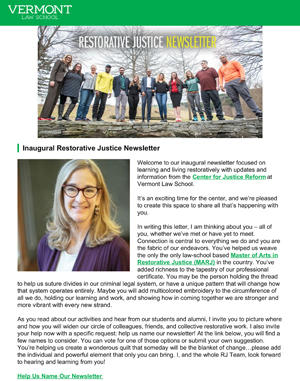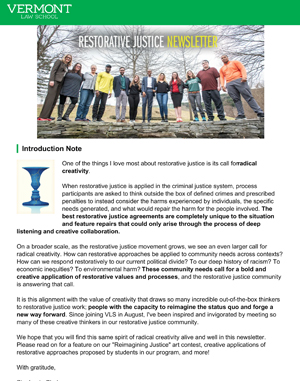
June 30, 2021
Wenfang Liang LLM'22 is a fellow with the U.S.-Asia Partnerships for Environmental Law (PEL), a Vermont Law School program that works collaboratively with government institutions, non-government organizations, lawyers, judges, lawmakers, and others to promote good environmental governance in Asia. This aspiring environmental attorney and advocate began her fellowship remotely from China earlier this spring, and hopes to travel to Vermont Law School campus this fall. Prior to the fellowship, she spent the last two years working as a staff attorney at the Chinese NGO Friends of Nature on a number of important environmental cases.
"Wenfang was a member of our first cohort of Environmental Mission Scholars and is really passionate about using legal tools to protect the environment," said PEL associate director and professor Yanmei Lin. "I am very excited to have her on board as our fellow, and hope that she can share her experiences and skills to help increase the legal advocacy capacity of civil society groups in less developed regions in China." We caught up with Wenfang to learn more about her interests and goals as she looks ahead to her year-long LLM fellowship.
Q. You were previously a VLS Environmental Mission Scholar, and you will be joining VLS as an LLM fellow in the spring. Why did you decide to pursue an LLM fellowship at Vermont Law School?
A. In October 2019, I took part in a two-week training conducted by Mekong Legal Advocacy Institute in Chiang Mai, Thailand. The program served as a learning platform for junior lawyers, policy analysts, and campaigners from the Mekong Region. Through the training, I learned that PEL is trying to build the support network and promote public participation not only in China but also in Southeast Asia—which is amazing! PEL is empowering people to protect their environmental rights.
It is also important to encourage discussions and cooperation between people concerned about environmental issues. The joint voice can be more effective to promote public participation, which is what PEL has been working on. Training programs like Environmental Mission Scholars, committed to the cultivation of young people, are meaningful, too. Hopefully I will have the chance to take action.
My experiences in Environmental Public Interest Litigation (EPIL) and policy advocacy has given me a better understanding of how Chinese environmental legal practices and the environmental governance system work. I really hope what I learned as a VLS Environmental Mission Scholar will contribute to PEL’s projects in China.
Q. Can you tell us about yourself? Outside of the legal profession, what are some of your hobbies?
A. I'm into drama and want to see Hamilton on Broadway. I also love nature and camping and will definitely visit several national parks when I get the chance.
Q. What are your academic interests?
A. Marine law, energy law, and transnational enterprise green accountability.
Q. What about your LLM fellowship are you most excited about?
A. The most important reason I applied to the PEL LLM fellowship is to have the opportunity to support the development of environmental protection forces, like NGOs, in China.
Q. How is your work for the program coming along? What are you looking forward to?
A. I have completed an online course, LLM Seminar, during Spring Term 1, and fully felt the benefits of VLS participatory teaching. We all discussed and learned together through the internet. I am looking forward to getting to campus as soon as possible and having more opportunities to exchange our thoughts.
Q. What have you learned about the differences between environmental law in China versus the United States?
A. There are many differences. I think the most essential differences lie between the two countries' institutional design, that is, centralization and separation of powers. Therefore, when China learns the American environmental law system, the two need to be combined in order to be enforced.
Q. What are you most looking forward to when coming to Vermont?
A. What I am looking forward to most is meeting and getting to know my teachers and classmates, and hoping to meet friends from all over the world. Hopefully we will be able to sit on campus, discuss issues related to environmental pollution and environmental health, and discuss what we can do to make the world more friendly and sustainable.
Q. What do you hope to gain from this experience?
A. I hope to gain knowledge on topics such as climate change, energy, and environmental human rights, gain more friends and see the larger world.


















